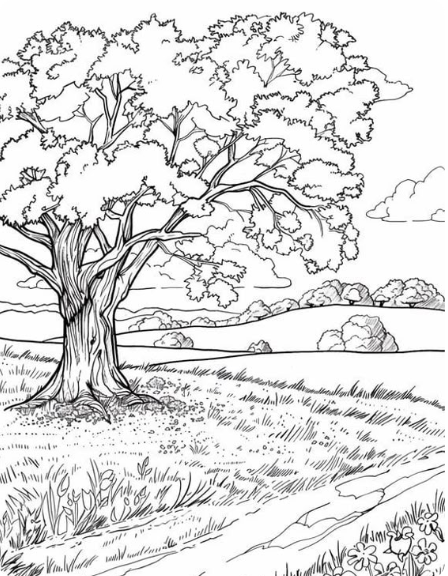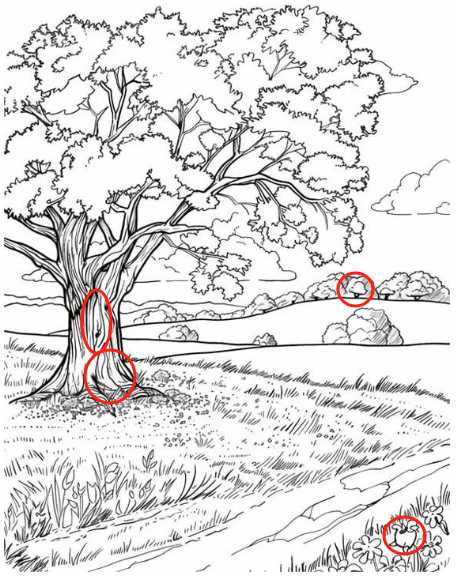Embrace the Majestic Oak: A Timeless Sentinel of the Countryside
Discovering the Grandeur of an Oak Tree
Have you ever paused beneath the broad canopy of a sprawling oak, its gnarled branches whispering stories of centuries past? In our image, a lone oak stands proudly in a windswept meadow, its deep roots anchored in fertile soil and its lush foliage framing rolling hills beyond. This scene isn’t just a picturesque coloring page—it’s a living testament to resilience, community, and the calming power of nature. Let’s wander down that winding path, explore the oak’s secrets, and learn why this tree continues to capture our hearts and imaginations.

Anatomy and Life Cycle of a Noble Oak
Before we lose ourselves in the pastoral beauty, let’s get to know the oak’s inner workings:
- Roots That Run Deep: Oaks forge extensive root systems—sometimes as wide as their branches—that lock into the earth, prevent erosion, and tap into hidden water reserves.
- Sturdy Trunks and Rugged Bark: The tree’s trunk, with its rugged, furrowed bark, acts like a shield against pests, fire, and harsh weather. As the oak ages, its bark thickens, revealing its storied history in every ridge and crack.
- Branching Architecture: Notice how the limbs stretch horizontally before curving upward? This structure maximizes sunlight exposure for the leaves, which unfurl in spring to absorb energy for photosynthesis.
- Seasonal Rhythms: Each year, fresh green leaves give way to acorn production in autumn—a vital food source for wildlife—before the canopy retires for winter, only to burst into life again come spring.
Understanding the oak’s life cycle deepens our appreciation for its silent endurance through seasons of change.

Ecological Benefits: More Than Just Shade
Oaks aren’t mere landscape decorations; they’re ecological powerhouses:
- Wildlife Hub: From squirrels caching acorns to songbirds nesting in leafy alcoves, oaks support hundreds of species. Insects feast on its foliage and bark, creating a vibrant food web.
- Carbon Capturers: A mature oak can sequester up to 48 pounds of CO₂ per year, making it a leafy ally in the fight against climate change.
- Soil Stewards: Fallen leaves and acorns decompose into rich humus, enriching the earth and promoting soil health for grasses and wildflowers below.
- Water Regulators: That winding root network absorbs heavy rainfall, reducing runoff and helping replenish local aquifers.
When you admire an oak, remember you’re looking at a living ecosystem, a green pillar sustaining countless forms of life.
Symbolism and Cultural Significance
Why has the oak held a place of honor in myths, heraldry, and folklore for millennia?
- Strength and Endurance: Ancient Greeks and Celts revered oaks as sacred—Zeus’s oracle sat beneath one sacred oak, while Druids performed rituals in oak groves.
- Wisdom and Knowledge: Oak leaves and acorns appear in laurel wreaths and academic regalia, symbolizing growth, wisdom, and longevity.
- Community and Family: With branches reaching wide and roots running deep, the oak reflects the ideal family: supportive, interconnected, and enduring across generations.
Each knot and leaf carries layers of human meaning, reminding us that our stories intertwine with nature’s grand narrative.

Immersive Experiences: Enjoying the Oak Meadow
Ready to step into the scene? Here are ways to engage deeply with an oak-dotted landscape:
- Mindful Moments: Sit beneath the canopy with a blanket and a book. Let the rustling leaves and dappled sunlight lull you into presence.
- Seasonal Sketching: Bring a sketchpad and capture the oak’s form across seasons—its spring buds, summer shade, autumn acorns, and winter silhouette.
- Photography Tips: Use a wide-angle lens at dawn or dusk to accentuate the tree’s sprawling branches against colorful skies. Play with backlighting to create glowing leaf edges.
- Acorn Crafts: Gather fallen acorns with permission, then craft simple necklaces or a rustic centerpiece—an eco-friendly souvenir of your outdoor adventure.
In each of these activities, you create memories and forge a personal bond with the oak’s timeless spirit.

Planting Your Own Legacy: How to Grow an Oak
Inspired to cultivate your own oak sentinel? Follow these simple guidelines:
- Choose the Right Species: White oaks thrive in well-drained soils, while bur oaks tolerate both drought and flood. Match species to your local climate.
- Site Selection: Plant in full sun with room to spread—avoid proximity to buildings or power lines.
- Acorn to Sapling: Collect healthy acorns in autumn. Soak them overnight, then stratify by refrigerating in moist sand for 6–8 weeks before planting in spring.
- Care and Maintenance: Water young trees deeply once a week during dry spells. Mulch a 2–3 foot circle around the base to retain moisture and suppress weeds.
- Protection: Use tree guards to shield saplings from deer or rodent damage until the trunk thickens.
With patience, you’ll watch your own oak rise from a humble sprout to a proud landmark.

Conclusion: Standing Tall with the Oak’s Wisdom
Our journey through the oak’s world—exploring its anatomy, ecological roles, cultural symbolism, and practical care—reveals why these trees capture our collective imagination. They teach us resilience, community, and the gentle power of patience. Whether you’re coloring this landscape, sketching its contours, or planting an acorn in your backyard, the oak invites you to pause, breathe, and root yourself in nature’s enduring tale. So next time you find yourself under a grand oak canopy, lean back, stretch out your arms, and let the silent wisdom of the ages fill your heart.





